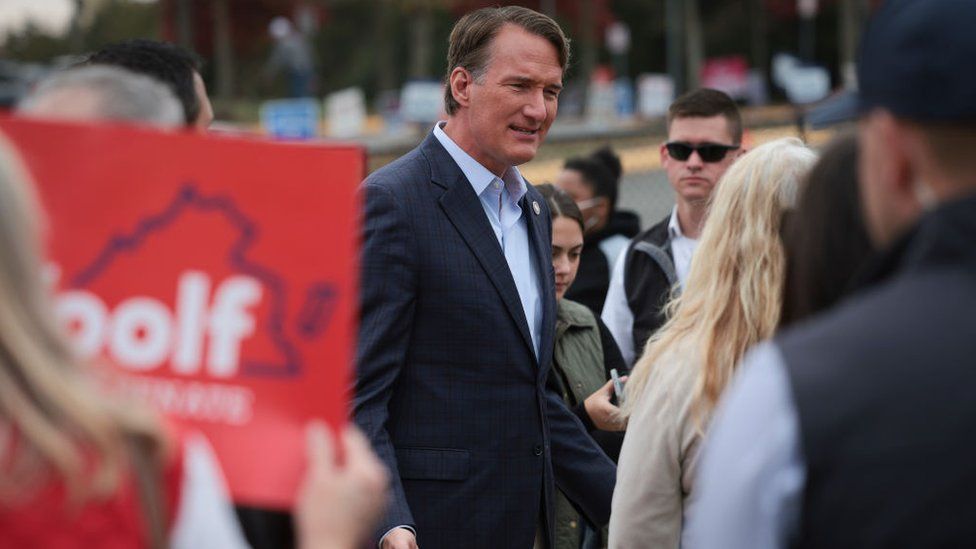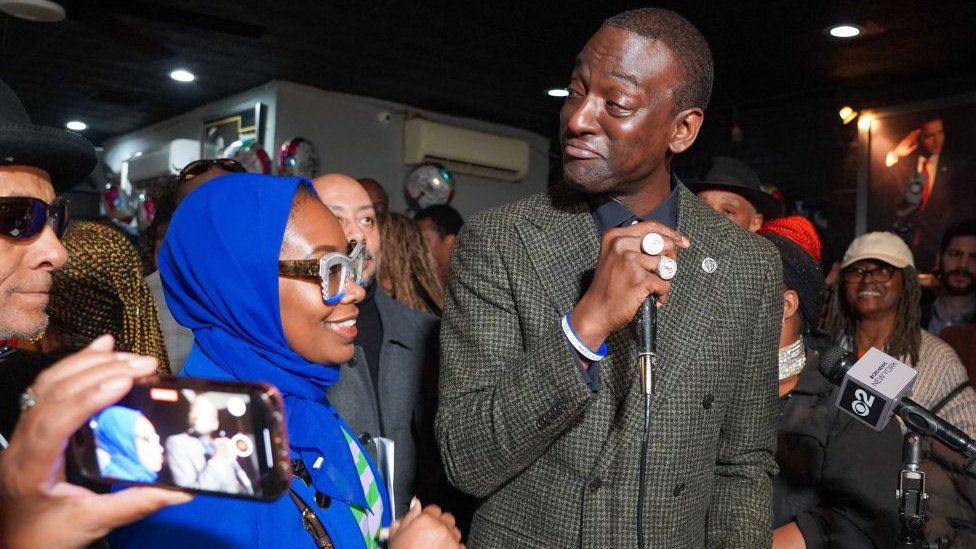
This article is more than
2 year old
Voters in some states went to the polls to decide their governor and who controls their legislature, while others considered changes to abortion and marijuana rights.
Democrats appeared to have much to be happy about, with particularly big wins in Ohio, Virginia and Kentucky.
But now that ballots are counted, here is what we learned so far from state elections in a dozen US states.
1) Abortion remains a top issue
Ohio voters backing an amendment to the state's constitution that will guarantee abortion rights proved to be Tuesday's most prominent example of how abortion remains a top issue in the United States.
But a number of other votes show the issue remains a motivating topic for American voters - and some viewed Tuesday night as a litmus test over whether it will be a winning issue heading into next year's presidential election.
For context, the US Supreme Court rescinded the nationwide right to abortion last year.
One takeaway from Ohio is that it was not just Democrats who voted to support the abortion rights ballot measure. One in five Republicans also voted yes on the measure, according to the BBC's US partner CBS.
"We're going to bed knowing that we own our own bodies," Dr Marcel Azevedo, co-founder of Ohio Physicians for Reproductive Rights, told a group of supporters after the measure passed.
Two separate Democratic bids for governor in southern states that former President Donald Trump won by large margins in 2020 help illustrate the importance of abortion access in US electoral politics.
Kentucky Governor Andy Beshear, a Democrat, made abortion access a central issue of his campaign and cruised to re-election against Republican rival Daniel Cameron.
Mr Beshear used abortion as a way to hammer his opponent. He painted Mr Cameron, a rising Republican star, as a radical on the issue.

In Mississippi, Democrat Brandon Presley, a utility regulator and a cousin of music icon Elvis Presley, was not so lucky. His anti-abortion stance may have damaged voter enthusiasm.
2) Big night for Democrats, a bad night for Youngkin
Democrats won key races in New Jersey, Pennsylvania and Virginia, where abortion again played a major role, especially in the campaign for the Virginia legislature.
Virginia Democrats are projected to maintain slim control of the state Senate and take control of the House of Delegates, which means the party can continue to block Republican Governor Glenn Youngkin's plan to pursue tighter abortion restrictions.
Gov Youngkin is considered another rising star in Republican politics, winning the Virginia governorship in 2021 without enlisting the help of former President Donald Trump. He gained support of moderates and independents in the suburbs when he first ran for the state's top political post.
That all nine of the LGBT candidates in the Virginia legislative races won their seats proved to be key for Democrats success on Tuesday. One of those wins belongs to Danica Roem, who will be the first openly trans state senator in the South. She defeated a candidate endorsed by Gov Youngkin who made his opposition to trans issues the cornerstone of his campaign.
It is just one of a number of blows suffered by Gov Youngkin on Tuesday night.

Some Republicans hoped the former financier might wrestle the party free from Donald Trump's grasp in the coming years - hopes that are now likely dampened.
Mr Trump is currently leading in polls for the 2024 Republican nomination, but some considered Gov Youngkin as a potential challenger.
Democrats' big win arrives as President Joe Biden appeared to struggle with a sputtering campaign a year from his re-election hopes.
Tuesday's success will likely allow the president and his campaign staff to take a breath and refocus their attention. Abortion is an issue where they could look to score some points against Mr Trump.
Campaign officials certainly saw it as an opportunity to dismiss criticism over recent polls that showed President Biden lagging behind Mr Trump.
"Voters vote. Polls don't," a senior campaign advisor told CBS News. The advisor added that Tuesday's success had relieved tensions within the presidential campaign.
3) From prison to politics? It's possible
As a teenager, Yusef Salaam was one of five black and Hispanic boys who were wrongfully accused of raping a jogger in Central Park in 1989.

The case gripped New York City and the group became known as the Central Park Five. Former President Trump even waded into the case at the time, calling for New York to adopt the death penalty after the attack.
Mr Salaam - who was 15 when he was arrested - was jailed for several years before a serial rapist confessed to the crime and the group's convictions were vacated.
On Tuesday, the author and activist won a seat on the New York City Council.
"In my darkest moments, when seemingly the world was against the so-called Central Park Five, I never gave up hope - and tonight, this victory represents hope for our Harlem community," he said.